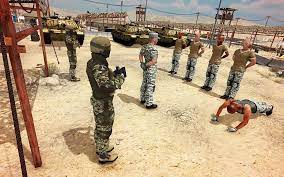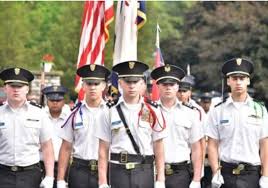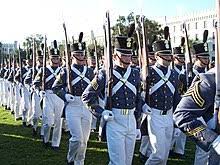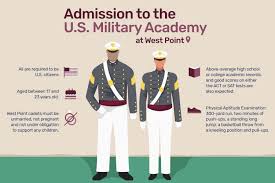The Soldier Training Academy: Preparing Our Troops for the Frontlines
The Soldier Training Academy is a rigorous and comprehensive training program designed to prepare soldiers for the challenges they will face on the battlefield. From physical conditioning to weapons training, this program is designed to provide soldiers with the skills and knowledge they need to succeed in combat.
The academy is divided into several phases, each focusing on a different aspect of soldier training. The first phase focuses on physical fitness, with soldiers undergoing intense physical conditioning exercises designed to build strength, endurance, and agility. This phase also includes basic weapons training, teaching soldiers how to safely handle and shoot firearms.
The second phase of the academy focuses on advanced weapons training. Soldiers learn how to use a variety of weapons in different scenarios, from close-quarters combat to long-range engagements. They also learn how to maintain and repair their weapons, ensuring that they are always in top condition.
The third phase of the academy focuses on tactics and strategy. Soldiers learn how to work together as a team, developing communication skills and learning how to coordinate their movements on the battlefield. They also learn about different types of terrain and how to navigate through them effectively.
Throughout all phases of the academy, soldiers are pushed to their limits both physically and mentally. They must demonstrate discipline, determination, and resilience in order to succeed. The goal is not just to create skilled soldiers but also leaders who can make quick decisions under pressure.
After completing the Soldier Training Academy, soldiers are ready for deployment anywhere in the world. They have been trained in all aspects of combat and are prepared for any situation they may encounter. The academy has produced some of our nation’s finest soldiers who have gone on to serve with distinction around the world.
In conclusion, the Soldier Training Academy is an essential part of our military’s training program. It prepares our troops for the realities of combat by providing them with intensive physical conditioning, advanced weapons training, tactics and strategy. The academy produces skilled soldiers who are ready for deployment anywhere in the world. We owe a debt of gratitude to the men and women who complete this rigorous program, as they are the ones who will defend our nation’s freedom and protect our way of life.
FAQs about Soldier Training Academy: Requirements, Benefits, Opportunities, and More
- How long does it take to complete a soldier training academy?
- What are the requirements for joining a soldier training academy?
- What type of physical and mental conditioning is required for soldier training academy?
- Are there any special benefits or incentives offered to those who attend a soldier training academy?
- What kind of job opportunities are available after completing a soldier training academy?
- How much does it cost to attend a soldier training academy?
- Are there any scholarships or grants available to help pay for soldier training academy tuition costs?
- What type of support and guidance is provided during the course of a soldier training program?
How long does it take to complete a soldier training academy?
The length of time it takes to complete a soldier training academy varies depending on the specific program and country. In the United States, for example, basic training for enlisted soldiers typically lasts 10 weeks, while advanced individual training can take anywhere from 7 to 52 weeks depending on the soldier’s military occupational specialty (MOS).
Officer Candidate School (OCS) in the US Army can take anywhere from 12 to 17 weeks depending on the branch of service and type of commissioning program. Special Operations Forces (SOF) training can take several months to over a year, depending on the specific unit and mission requirements.
In other countries, soldier training academies may have different lengths and requirements. However, regardless of the length of time it takes to complete a soldier training academy, all programs are designed to provide soldiers with the skills and knowledge they need to succeed in combat and protect their country.
What are the requirements for joining a soldier training academy?
The requirements for joining a soldier training academy can vary depending on the specific program and branch of the military. However, there are some general requirements that are typically consistent across different programs:
- Age: Most soldier training academies require applicants to be at least 18 years old, although some may accept applicants who are 17 with parental consent.
- Education: Applicants must have a high school diploma or equivalent (such as a GED).
- Physical fitness: Applicants must meet certain physical fitness standards, which may include running, push-ups, sit-ups, and other exercises.
- Citizenship: Applicants must be U.S. citizens or permanent residents.
- Background check: Applicants must undergo a background check to ensure they have no criminal history or other issues that would disqualify them from military service.
- Medical exam: Applicants must pass a medical exam to ensure they are in good health and able to meet the physical demands of military training.
- ASVAB test: Many soldier training academies require applicants to take the Armed Services Vocational Aptitude Battery (ASVAB) test, which measures their aptitude for various military occupations.
Keep in mind that these are general requirements and that specific programs may have additional requirements or variations on these requirements. It’s best to check with the specific program you’re interested in to get more detailed information about their admission requirements.
What type of physical and mental conditioning is required for soldier training academy?
The physical and mental conditioning required for the Soldier Training Academy is intense and rigorous. Soldiers must be physically fit and mentally strong in order to complete the program successfully.
Physical conditioning includes a variety of exercises such as running, weightlifting, calisthenics, and obstacle courses. These exercises are designed to build strength, endurance, agility, and overall physical fitness. Soldiers are pushed to their limits during these exercises to prepare them for the physical demands of combat.
Mental conditioning is equally important. Soldiers must be mentally tough and resilient in order to succeed in combat. The academy teaches soldiers how to handle stress and pressure effectively so that they can make quick decisions under difficult circumstances. They also learn how to work together as a team, developing communication skills and learning how to coordinate their movements on the battlefield.
The academy also places a strong emphasis on discipline and self-control. Soldiers are taught how to follow orders without question and how to maintain focus even in chaotic situations. They are also taught about the importance of maintaining high standards of personal conduct at all times.
Overall, the physical and mental conditioning required for the Soldier Training Academy is demanding but necessary. It prepares soldiers for the realities of combat by providing them with intensive training in all aspects of warfare. Those who successfully complete this program are among our nation’s finest soldiers who have gone on to serve with distinction around the world.
Are there any special benefits or incentives offered to those who attend a soldier training academy?
Yes, there are several benefits and incentives offered to those who attend a soldier training academy.
Firstly, soldiers who complete the academy receive a significant boost in their rank and pay grade. This is because the training they receive is considered to be some of the most intensive and comprehensive military training available.
In addition to this, soldiers who complete the academy are often given priority for promotion opportunities. This is because they have demonstrated exceptional discipline, determination, and leadership skills during their training.
Soldiers who complete the academy may also be eligible for various educational benefits, such as tuition assistance or student loan repayment programs. These benefits can help them further their education or pursue other career opportunities after their military service is complete.
Finally, soldiers who complete the academy often have access to specialized units or assignments that require advanced skills or training. This can lead to unique career opportunities and experiences that are not available to other soldiers.
Overall, attending a soldier training academy can provide significant benefits and incentives for those who complete it. These benefits can help soldiers advance in their careers, further their education, and gain access to unique career opportunities within the military.
What kind of job opportunities are available after completing a soldier training academy?
Completing a soldier training academy can open up a range of job opportunities both within and outside of the military. Here are some examples:
- Active Duty Military: After completing a soldier training academy, many soldiers go on to serve in active duty military roles. These can include infantry, special forces, aviation, logistics, and many other branches of the military.
- Reserves or National Guard: For those who want to continue serving but also pursue civilian careers or education, the reserves or national guard can be an excellent option. These roles typically require part-time service but also offer benefits such as tuition assistance.
- Law Enforcement: Many law enforcement agencies actively recruit veterans due to their training and experience in combat situations. This can include local police departments, state troopers, and federal agencies such as the FBI or DEA.
- Private Security: Private security firms often seek out veterans for their expertise in weapons handling and tactical operations. This can include positions such as bodyguards for high-profile clients or security personnel for private companies.
- Government Agencies: Veterans with specialized training may be eligible for positions within government agencies such as the Department of Defense or Homeland Security.
- Civilian Careers: The skills learned in a soldier training academy can be applied to many civilian careers as well. For example, leadership skills learned in the military can translate well into management positions in the private sector.
Overall, completing a soldier training academy opens up a range of job opportunities both within and outside of the military. The skills learned during this rigorous training program are highly valued by employers across many different industries and sectors.
How much does it cost to attend a soldier training academy?
The cost of attending a soldier training academy will vary depending on the specific program and type of training. Some military academies, such as the United States Military Academy (West Point) and the United States Air Force Academy, are free to attend but require a congressional nomination. Other military academies may have tuition fees ranging from several thousand dollars to tens of thousands of dollars.
Are there any scholarships or grants available to help pay for soldier training academy tuition costs?
There may be some scholarships or grants available to help pay for Soldier Training Academy tuition costs, depending on the specific program and location. It is important to research and reach out to the academy or military branch offering the program for more information.
One potential resource for financial assistance is the GI Bill, which provides education benefits to eligible veterans and their dependents. The GI Bill can be used to cover tuition costs for approved programs, including some military training programs like the Soldier Training Academy.
Another option is to explore scholarships and grants offered by military organizations or private foundations that support veterans and active duty military personnel. Some of these organizations may offer funding specifically for military training programs like the Soldier Training Academy.
It is also worth checking with local community organizations, such as veterans’ groups or civic organizations, as they may offer financial assistance or know of resources available in the area.
Overall, while there may not be a wide range of scholarship and grant options specifically for Soldier Training Academy tuition costs, there are resources available that can help alleviate some of the financial burden. It is important to research all options thoroughly and reach out to relevant organizations for more information.
What type of support and guidance is provided during the course of a soldier training program?
During the course of a soldier training program, soldiers receive various types of support and guidance to help them succeed. Here are some examples:
- Experienced Instructors: The training program is led by experienced instructors who have served in the military themselves. They have firsthand knowledge of what it takes to succeed on the battlefield and can provide valuable guidance and advice.
- Mentorship: Soldiers are often paired with a mentor who has already completed the training program. This mentor can provide additional support and guidance throughout the training process.
- Counseling: The military recognizes that soldiers may experience stress or trauma during their training, so counseling services are available to help soldiers cope with these challenges.
- Physical Training: Soldiers receive comprehensive physical conditioning training to help them build strength, endurance, and agility. Trainers work with soldiers individually to help them achieve their fitness goals.
- Team Building Exercises: Soldiers participate in team building exercises designed to improve communication skills and develop trust among team members.
- Feedback and Evaluation: Throughout the training program, soldiers receive feedback on their performance from instructors and peers. This feedback helps them identify areas where they need to improve and make adjustments accordingly.
- Career Planning: Soldiers receive guidance on career planning, including information about different career paths within the military and how to advance through the ranks.
Overall, soldier training programs provide comprehensive support and guidance for soldiers as they prepare for combat situations. This support helps soldiers develop the skills they need to succeed while also ensuring that they are mentally and emotionally prepared for the challenges ahead.




